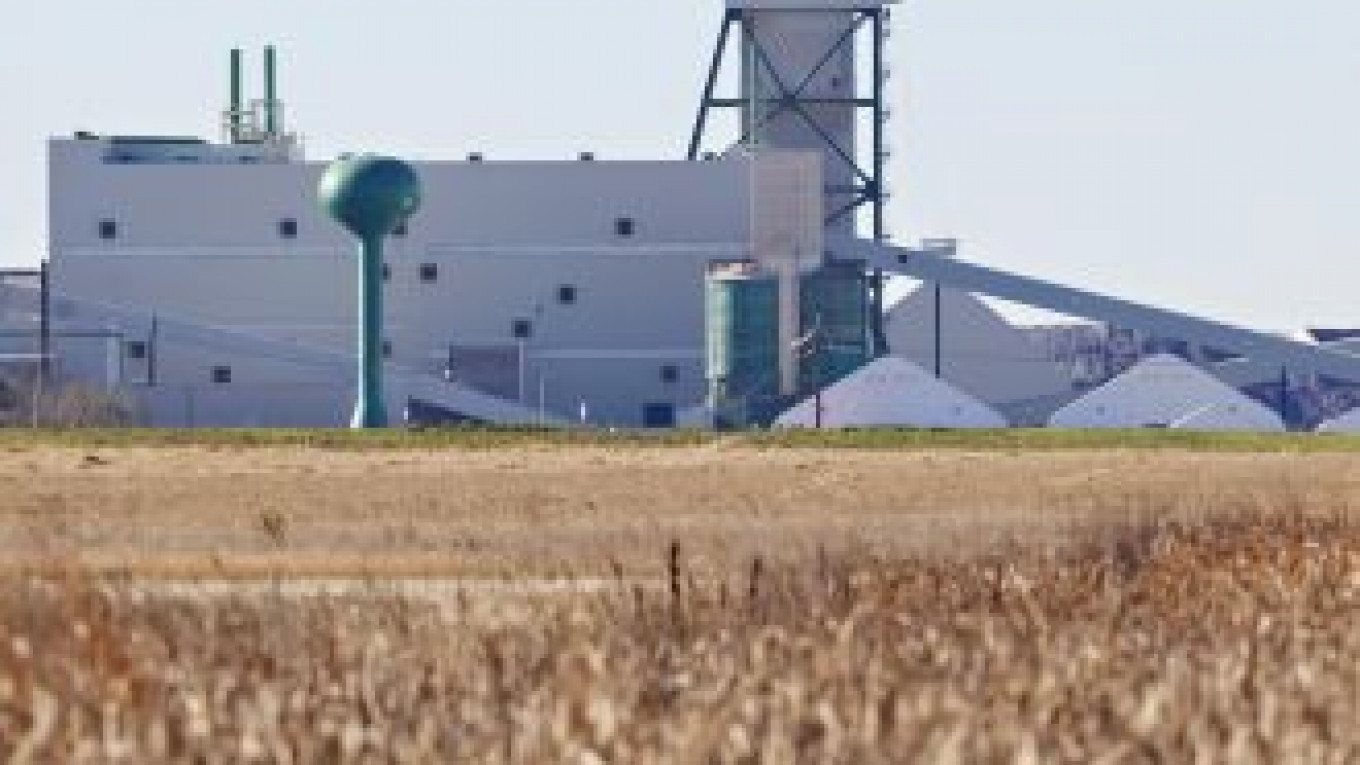PhosAgro, the country's largest maker of phosphate fertilizers, is studying a joint bid with domestic competitors for Potash Corp. of Saskatchewan after Canada blocked a $40 billion unsolicited offer by BHP Billiton.
PhosAgro is in "intensive consultations" with the Russian government as well as local and foreign banks on a possible deal, the company said Thursday in an e-mailed statement. The producer will announce its plans after Nov. 15, the statement said.
The government asked domestic producers to consider a bid, according to Acron, the nation's third-largest producer of nitrogen soil nutrients. Russian fertilizer companies, including Silvinit, the largest potash maker, and Uralkali, have been studying merging to expand output as shrinking arable land and rising world food demand spur consumption of their products.
Acron will not join a bid for Saskatchewan-based Potash Corp. after receiving an Industry and Trade Ministry proposal Nov. 1, chairman Alexander Popov said Wednesday. Artur Gimatdinov, a ministry spokesman, said the same day that the state was "ready to support" any Russian company in buying foreign assets.
PhosAgro asked the state to help fund a Potash Corp. deal, Vedomosti reported Wednesday, citing an Oct. 20 letter from chairman Vladimir Litvinenko to Prime Minister Vladimir Putin.
Canadian Prime Minister Stephen Harper's government said a sale of the world's largest fertilizer company to BHP, which faced opposition from politicians and investors, wouldn't provide a "net benefit" to Canada. Australia-based BHP, the world's biggest mining company, has 30 days to appeal.
BHP is "disappointed" with Canada's rejection of its bid, will continue to work with the government and will review its options, the company said in a filing. BHP's bid is still "wholly inadequate," Potash Corp. said in a statement in response to the government's decision.
"PhosAgro is considering the possibility of participating in a deal to buy shares of Potash Corp.," the company said in the statement. "At the present time, PhosAgro is conducting intensive consultations with the Russian government, Russian and foreign banks on a possible deal."
A PhosAgro offer is not viable because the company is much smaller than Potash Corp., Troika Dialog said.
"We struggle to find the proposed transaction as plausible, simply given the startling difference in size between PhosAgro and Potash Corp.," Troika Dialog wrote in a research note. PhosAgro, a closely held company, is worth about $7 billion to $9 billion, Troika said, in comparison with Potash Corp.'s market capitalization of $43 billion.
Only if PhosAgro merged with Russian potash producers Uralkali and Silvinit to form a single company worth $25 billion to $30 billion "would the remote potential to make a bid for Potash Corp. appear," analysts at Troika wrote.
In his letter to Putin, Litvinenko said Canadian banks had agreed to provide half the funding for a takeover and Russian banks should provide the remainder, according to Vedomosti.
While there has been reported interest from Chinese and Indian companies in making a counterbid for Potash Corp., nothing has materialized so far, Troika said.
"It's absolutely senseless for Russia to spend $40 billion on acquiring Potash Corp.," Acron's Popov said by phone Wednesday from Moscow. "If the country has a spare $40 billion, it would be much more effective to put it into the Russian economy."
Putin passed PhosAgro's request to Deputy Prime Minister Igor Sechin, who contacted ministries and state banks, Vedomosti reported, without citing anyone. A state official said he couldn't speak about private correspondence, while Putin's spokesman, Dmitry Peskov, didn't answer calls to his mobile phone.
Thursday and Friday were not working days in Russia.
Silvinit and Uralkali are both controlled by billionaire Suleiman Kerimov and his partners, who plan to merge them.
Uralkali advanced to its highest in more than two years Wednesday after it was upgraded by Goldman Sachs Group to "buy," citing stronger crop prices and rising potash price forecasts.
The stock added 5.8 percent to 163.12 rubles at the close in Moscow, its strongest level since September 2008.
A Message from The Moscow Times:
Dear readers,
We are facing unprecedented challenges. Russia's Prosecutor General's Office has designated The Moscow Times as an "undesirable" organization, criminalizing our work and putting our staff at risk of prosecution. This follows our earlier unjust labeling as a "foreign agent."
These actions are direct attempts to silence independent journalism in Russia. The authorities claim our work "discredits the decisions of the Russian leadership." We see things differently: we strive to provide accurate, unbiased reporting on Russia.
We, the journalists of The Moscow Times, refuse to be silenced. But to continue our work, we need your help.
Your support, no matter how small, makes a world of difference. If you can, please support us monthly starting from just $2. It's quick to set up, and every contribution makes a significant impact.
By supporting The Moscow Times, you're defending open, independent journalism in the face of repression. Thank you for standing with us.
Remind me later.






